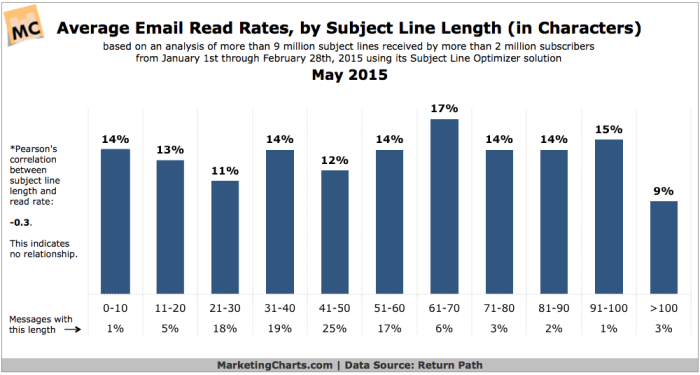
The Huffington Post writes several headlines for every article and then tests them to see which one works best. Over at Upworthy, they write 25 headlines for every article and will measure which one gets the most readers, ultimately sticking with that one. Headline writing for popular media sites is now as much of a science as it is an art.
But there is a message in their methodology. If your headline is not right, you won’t get readers in this fast-paced, distraction-heavy online world. These sites often spend more time on writing the headlines than they do on the article or blog post itself. Indeed, in the world of newspapers the people writing the headlines are usually paid more than the writers of the text below them. Not only that, big-selling tabloids usually have a couple of people whose sole job is to write the front page “splash” headline.
When it comes to email, the subject line is your headline. It is the first thing people see, and it is instrumental in helping recipients make the decision whether or not to open the message.
So the question is, how many alternative subject lines do you write for your emails? Do you split test your email subject lines to find the ones with the best open rates? It is also worthwhile reflecting on how much time you spend writing the subject line, compared with the text of the email itself. If you want the best open rates – particularly for marketing emails – you need to spend more time writing the subject line than you do in writing the email itself.
However, this all takes time. So, how can you write truly engaging email subject lines without spending hours on them? The answer is found in new research that investigated the engagement rate of different kinds of email subject lines.
The study looked at more than 9 million email subject lines in over 3,000 companies sending out emails to more than 2 million people. So it is a substantial study.
Contrary to popular belief, the research discovered that there was no relationship between the length of the subject line and open rates.
The study also found there were some real “turn-off” words in subject lines, including the often used word “free” as well as “secret of” – both words that so-called Internet Marketing Gurus recommend you use.
What is more important is that the “call to action” is at the beginning of the subject, rather than at the end. Furthermore, the study revealed that there were some words that had a positive effect on opening rates such as “still time” or “fastest”. This suggests people prefer saving time to saving money.
So how can you use this information to speed up your subject line writing?
The first thing to realise is that in spite of what many people say, stop worrying about fitting your subject line into a certain number of characters. Focus on the quality of your subject, not the quantity of the characters. That will speed your writing up.
Next, forget trying to squeeze in all those so-called marketing phrases such as “free” or “secrets” and so on. Again, you are less creative with headline writing when you feel compelled to use particular words. When you remove the pressure for specific wording, you’ll write more quickly.
You could stimulate your subject line writing by using some tools, such as Content Row’s title generator, the browser extension Headlinr or the WordPress plug-in KingSumo Headlines.
You could also check out each subject line you write using the Headline Analyzer or the CoSchedule Headline Analyzer.
Three steps to fast subject line writing
- Focus on the reader and tell them immediately what action to take
- Forget about the length of the headline or using so-called trigger wording
- Check you subject line using an analysis tool
That’s it – do that and your subject lines will engage people and you will get higher open rates. However, it is worthwhile focusing more attention on the subject line than on the email itself.

